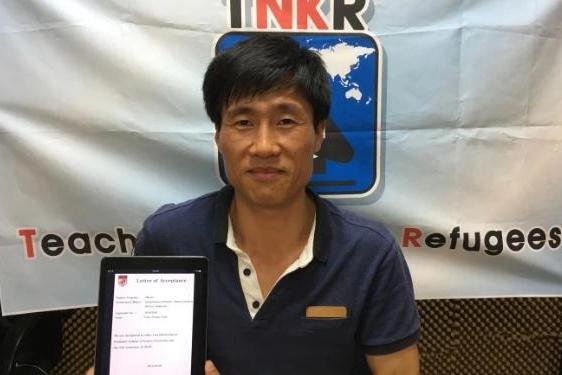

“We received anti-U.S. training nearly every day and had been informed to reward the father Kim Il Sung and son Kim Jong Il,” Eom told UPI in a latest cellphone interview about a process that he in comparisonto brainwashing.Eom, 35, who now lives in South Korea, left the North in 2010. He arrived in the South aftersearching for asylum at the South Korean Embassy in Thailand.
but his troubles were some distance from over.
North Korea is deeply impoverished and comparatively remoted and North Korean defectors like Eom are materially higher off inside the South.
but even when food issues not haunt defectors in the wealthier Korea, new issues emerge.
a number of the challenges defectors face can be attributed to the surprising setting of the South, and aloss of South Korean familiarity with North Koreans. South Koreans nevertheless will be inclined to lookdown on defectors, and the society’s networks are hard to penetrate for outsiders.
“Prejudice is maximum difficult to cope with. In South Korea information, there is a stereotype of North Korea associated with violence or communist totalitarianism,” Eom stated, describing how the media impactslocal perceptions of his birthplace.
Bouncing again after suffering in silence
other problems persist because defectors new to the South lack understanding of the fundamentalworkings of a capitalist society and war with English, which has been tailored to the South Korean vernacular.
these and different setbacks bring about a lack of self belief among defectors who come to be resigned to emotions of inferiority and attempt to disguise their identity, Eom said.
but the former North Korean soldier said he resolved not unusual issues by using stepping out of the concern zone and searching for help with everyday problems.
“when I commenced telling humans i’m from North Korea and opening up, humans around me became asupply of assist,” Eom said.
The sort of assist defectors want is growing with accelerated public consciousness of human rightstroubles, and as greater North Korean refugees, now approaching 30,000, resettle in the South.
Casey Lartigue, an American in Seoul who co-based educate North Korean Refugees, suits North Korean defectors with volunteer English teachers in Seoul.
given that 2013, Lartigue said there hasn’t been a shortage of interest from defectors in his agency.
“we’ve a waiting list of approximately 65 refugees,” Lartigue stated.
a few North Koreans who knew Lartigue from a previous volunteering undertaking discoveredapproximately TNKR through facebook photos. They were right now interested, he stated, and theorganization has had more than 230 refugees take part in the program, taking instructions fromapproximately 420 volunteer teachers.
but it’s now not simply assist with English that draws defectors struggling with their new surroundings. A separate application allows a few members to speak out about North Korea and overcome the stigmaof their identity.
“We assist refugees discover their way and tell their story,” Lartigue stated. up to now less than 20 defectors have taken to the level to talk in public, most famously Yeonmi Park, a 22-yr–old defector whobecame globally regarded after speaking at the one young global 2014 Summit in Dublin, ireland, and on the Oslo Freedom forum.
handling being a ‘extraordinary‘ Korean
it is never smooth, although, for North Koreans to talk out after dwelling underneath an authoritarian regime.
“some of them have by no means given a public speech. In North Korea they simply repeat what the dictator wants them to mention and in China they are not seeking out an possibility to speak out,” Lartigue stated.
That avoidance of the limelight maintains in South Korea, in which defectors do not sense prompted to attract attention.
Eom stated defectors come upon uncomfortable questions about their origins.
South Koreans ask, “Are they ravenous in North Korea? Do they have got leisure activities, like [karaoke] up there?” Eom stated.
Eom said that after he changed into invited to a Korean family‘s domestic in Canada, where he in briefstayed to enhance his English, the determine of the household brought him to his youngsters as a guest“from the North,” but brought in jest, “See, his face is not red” and they need not worry because there are “no horns on his head.”
it’s the consistent reminders of being unique that can chip away at the mental well-being of defectors,however Eom said that “too little confidence isn’t always proper,” and newly arrived North Koreans needto prioritize.
“Many defectors consciousness first on making a living after they get here, and so that they frequentlyvisit factories to paintings,” Eom stated. “however for defectors who are nevertheless relatively younger, receiving precious education or education must come first.”
Eom said his selection to visit Canada for six months to study English helped him adjust to existence in the South.
Overcoming old divisions
Eunkoo Lee, the South Korean co-founding father of TNKR, stated North Korean refugees are in a difficultscenario due to the fact as compared to the North the South gives “too many picks.”
journeying from a society that gives little to no character freedom to a place where too much freedom isaround the nook may be overwhelming for defectors, Lee said.
loss of South Korean familiarity with defectors can also bring about employment discrimination in a activitymarketplace wherein North Koreans are often as compared to ethnic Koreans from China, who comprise a bigger network of 750,000, in keeping with a South Korean press estimate from 2015.
Discrimination surfaces while a defector speaks in a North Korean accent that can sound “atypical” to an unprepared South Korean agency. Refugees subsequently conceal their origins or find it difficult todeliver up the topic of their families, Lee stated.
Discouraging memories of defector struggles, however, are not the whole thing.
Lee said the defectors who participate in TNKR applications show commitment and take responsibilityfor his or her research, the form of success that “can’t be scored, however indicates up in incrementalresults.” a number of the North Korean students are sometimes matched with South Korean tutors, who have had little to no exposure to defectors.
“The great manner to remedy differences is for North and South Koreans to turn out to be friends, with out prejudice,” Lee said. “I suppose defectors want to be seen, in place of as human beings from the North, as everyday human beings, as pals, who live aspect with the aid of facet with South Koreans.”




